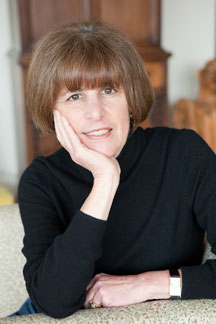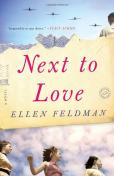BKMT READING GUIDES
Next to Love: A Novel
by Ellen Feldman
Kindle Edition : 320 pages
12 clubs reading this now
1 member has read this book
It’s 1941. Babe throws like a boy, thinks for ...
Introduction
For fans of The Guernsey Literary and Potato Peel Society, The Postmistress, and Hotel on the Corner of Bitter and Sweet, a story of love, war, loss, and the scars they leave set during the years of World War II and its aftermath.
It’s 1941. Babe throws like a boy, thinks for herself, and never expects to escape the poor section of her quiet Massachusetts town. Then World War II breaks out, and everything changes. Her friend Grace, married to a reporter on the local paper, fears being left alone with her infant daughter when her husband ships out; Millie, the third member of their childhood trio, now weds the boy who always refused to settle down; and Babe wonders if she should marry Claude, who even as a child could never harm a living thing. As the war rages abroad, life on the home front undergoes its own battles and victories; and when the men return, and civilian life resumes, nothing can go back to quite the way it was.
From postwar traumas to women’s rights, racial injustice to anti-Semitism, Babe, Grace, and Millie experience the dislocations, the acute pains, and the exhilaration of a society in flux. Along the way, they will learn what it means to be a wife, a mother, a friend, a fighter, and a survivor. Beautiful, startling, and heartbreaking, Next to Love is a love letter to the brave women who shaped a nation’s destiny.
“Impossible to put down.” —Stacy Schiff
Look for special features inside. Join the Circle for author chats and more.
Editorial Review
A Conversation with Author Ellen Feldman
 Q: Next to Love follows the lives of three young women--Babe, Grace, and Millie--during World War II and its aftermath. Though childhood friends, their friendship in its adult years is occasionally rocky. Do you think the recent spate of books and movies about women’s friendship romanticize the relationship as we used to romanticize men–women relationships?
Q: Next to Love follows the lives of three young women--Babe, Grace, and Millie--during World War II and its aftermath. Though childhood friends, their friendship in its adult years is occasionally rocky. Do you think the recent spate of books and movies about women’s friendship romanticize the relationship as we used to romanticize men–women relationships? A: Women’s friendships can be rare and wonderful, deep with trust and buoyant with humor and support. Over the years I have found my own close ties to women to be rich and sustaining. But I do think a distinction has to be made between valuing women’s friendships and idealizing them. Many recent books and movies tend to do the latter. When all else fails, they imply, we still have one another. An unfortunate corollary to this attitude is the idea that men are unreliable and likely to behave badly. I do believe there are distinctions between men and women, but I don’t think the fault line lies at friendship. I cherish my women friends, but I also have several men friends whom I treasure. The relationship is different but no less prized. I don’t believe either gender has the market cornered on loyalty, generosity, or kindness.
Q: In your acknowledgments you give partial credit for your inspiration to the Bedford Boys of Virginia. Who are the Bedford Boys?
A: The Bedford Boys were a group of young men from the town of Bedford, Virginia (population 3200), who joined the National Guard before World War II. They went through training together, shipped out to England together in September 1942, and were among the first American G.I.’s who landed on Omaha Beach on D-Day, June 6, 1944. Nineteen of them died in the first minutes of the landing, twenty-two in the invasion. Six weeks later, on July 16, the Western Union teletype machine at Green’s Drug Store in Bedford began rattling out the messages from the War Department. It was said that no other community in America lost more of its young men in a single day. Revisionist history now suggests that the casualties came not from the town, but from the county of Bedford. Geography is beside the point. Whether to town or county, the loss was staggering, the ripples from it heartbreaking and enduring.
Though the Bedford Boys were part of the inspiration for Next to Love, I was careful not to research the lives of the actual young men from Bedford who served in World War II. I wanted to write a novel about love and loss, and the scars they leave rather than an account of those particular men and the loved ones they left behind.
Q: Next to Love is about women on the home front. How did the lives of the women left at home change during the war and after it?
A: With sixteen million men off fighting the war, millions of women took what were then thought of as men’s jobs. When the men returned home, the women were expected to give up those jobs, but many of them had gotten used to making their own decisions and their own money, and were reluctant to go back to what was deemed their proper domestic role. Some industries that catered to women recognized the problem and came up with a solution. Dior’s New Look fired the first salvo. While the trousers and short skirts of war- time encouraged women to stride and reach, Dior’s designs were intended to keep them in place. Who could move in those tight bodices, cinched waists, and yards and yards of long, full skirts?
The recipes of the era also show a marked change after the war. During the war, women who were on an assembly line or in an office all day were still expected to get dinner on the table each evening. With that in mind, the March 1944 issue of Good Housekeeping featured recipes illustrated with twin clocks showing start and finish times. After the war, the idea was to keep a woman in the kitchen for as long as possible. A 1950 dinner recipe in the same magazine begins preparations right after breakfast. Similarly, the dish that opens Babe’s eyes in the novel, which comes from an actual cookbook of the early postwar years, calls for thirty-two ingredients. But the female genii that had escaped from the bottle could not be forced back in. It is no accident that the feminist revolution of the seventies was made by the daughters of the women who went out to work in the forties.
Q: One aspect to Next to Love has special resonance with the Jewish community--more than half a million young Jewish men left home to serve in World War II. What affects and transformations did the war have on individual American Jews and their communities?
A: Those half million young Jewish men left largely ghettoized existences to live among strangers of every religious and ethnic back- ground. Some of those strangers, who hailed from big cities, knew Jews--and hated them. Others from the countryside had never seen a Jew before--and still knew they hated them.
Many of the Jewish G.I.’s found themselves fighting battles in the barracks before they even reached the front. Often, they had to work harder to prove themselves. Some made friendships that broadened their horizons, and the nation’s. Others learned different lessons from the bigotry.
There were personal struggles as well. To eat ham for Uncle Sam, as the saying went, or to bypass it and go hungry after a day of grueling physical activity. To take off dog tags with the telltale H, for Hebrew, in case of capture by the Germans, or to leave them on in pride and in fear of dying anonymously.
The young men who went off to war as G.I. Jews came home as G.I. Joes. Never again would they settle for second-class citizen- ship in the country they had fought and lost buddies for. No longer would they put up with restricted neighborhoods and clubs, and college quotas, and signs that said no dogs or Jews. They are the generation who helped shape the America we inhabit today.
Q: Did the war have a similar effect on African Americans?
A: Hardship, danger, and proximity have a way of undermining bigotry. The problem for African Americans, however, was that they did not live cheek-by-jowl with their white counterparts. The armed services were not integrated until three years after the end of the war.
Many of the approximately one million blacks who served in the war believed that by proving their mettle in battle, they could win equality at home. It did not work out that way. For one thing, the government deemed blacks incompetent for fighting. Even those fifty thousand who did see combat returned home to the kind of racist treatment they had fought against overseas. As one soldier put it, “I killed--I repeat, killed--other men in the name of democracy. Could the joke have been on me for being naïve enough to believe my government?”
But the African Americans who returned home from serving their country, and often receiving better treatment abroad, were no longer willing to accept second-class citizenship. The injustice they suffered in the military, the hardship they endured, and the confidence and competence they achieved fanned the flame that would become the civil rights movement.
Q: Babe, Grace, Millie, and their men all suffer the scars of war, from the loss of loved ones to post-traumatic stress disorder. At the time, therapy and support groups were uncommon and silent suffering was viewed as virtuous. Our own era believes in openness as a cure, or at least as a form of solace. Do you think Babe, Grace, and Millie would have had an easier time if they had shared their problems and unhappiness?
A: I thought about the question frequently as my characters endured pain and suffered its long-term scars silently. There is no doubt that friends and loved ones can offer support and sometimes even provide perspective. They can also confuse the issue, delivering unwanted advice, projecting their own misfortunes, over- stepping boundaries. In one scene in the book, as Babe faces a crisis, she thinks about what Grace and Millie would tell her to do. But she knows that their solutions do not apply to her marriage. That said, there is no doubt that professional treatment and sup- port groups can help those suffering from post-traumatic stress disorder and other battle-related conditions.
Discussion Questions
No discussion questions at this time.Book Club Recommendations
Recommended to book clubs by 0 of 0 members.
Book Club HQ to over 90,000+ book clubs and ready to welcome yours.
Get free weekly updates on top club picks, book giveaways, author events and more








